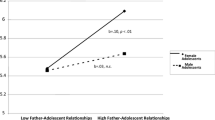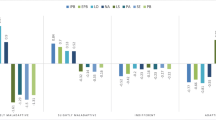Abstract
This study was designed to investigate how psychological separation and parental attachment are related to career maturity separately and simultaneously and to investigate the influence of gender on the relationships among these variables. Subjects were 82 single white college freshmen from intact families. Data analysis using a canonical correlation analysis revealed that although psychological separation is relevant, parental attachment plays a more important role in career maturity. The relationship among the variables did not differ for men and women. The implications of this study for theory and counseling practice are discussed and recommendations for future research are presented.
Similar content being viewed by others
References
Ainsworth, M. D. S. (1989). Attachments beyond infancy. American Psychologist, 44, 709-716.
Armsden, G. C., & Greenberg, M. T. (1987). The Inventory of Parent and Peer Attach ment: Individual differences and their relationships to psychological well-being in adolescence. Journal of Youth and Adolescence, 16, 427-454.
Armsden, G. C., & Greenberg, M. T. (1989). The Inventory of Parent and Peer Attachment: Preliminary test manual. Available from G. C. Armsden, 1554 NE 95th St. Seattle, WA 98115.
Betz, N. E. (1988). The assessment of career development and maturity. In W. B. Walsh & S. H. Osipow (Eds.), Career decision making (pp. 77-136). Hillsdale, NJ: Erlbaum.
Birk, J. M., & Blimline, C. A. (1984). Parents as career development facilitators: An untapped resource for the counselor. School Counselor, 31, 310-317.
Blos, P. (1967). The second individuation process of adolescence. Psychoanalytic Study of the Child, 22, 162-186.
Blustein, D. L., Walbridge, M. M., Friedlander, M. L., & Palladino, D. E. (1991). Contributions of psychological separation and parental attachment to the career development process. Journal of Counseling Psychology, 38, 39-50.
Bowlby, J. (1988). A secure base: Parent-child attachment and healthy human development. New York: Basic Books.
Dillard, J. M., & Campbell, N. J. (1981). Influences of Puerto Rican, Black, and Anglo parents' career behavior on their adolescent children's career development. Vocational Guidance Quarterly, 30, 139-148.
Franz, C. E., & White, K. M. (1985). Individuation and attachment in personality development: Extending Erikson's theory. Journal of Personality, 53, 224-256.
Grotevant, H. D., & Cooper, C. R. (1986). Individuation in family relationships: A perspective on individual differences in the development of identity and role taking skill in adolescence. Human Development, 29, 82-100.
Grotevant, H. D., & Cooper, C. R. (1988). The role of family experience in career exploration: A life-span perspective. In P. B. Baltes, D. L. Featherman, & R. M. Lerner (Eds.), Life-span development and behavior (Vol. 8, pp. 231-258). Hillsdale, NJ: Erlbaum.
Guisinger, S., & Blatt, S. J. (1994). Individuality and relatedness: Evolution of a fundamental dialectic. American Psychologist, 49, 104-111.
Hesser, A. (1984). Adolescent career development and the family system. Houston, TX: American Association for Counseling and Development. (ERIC Document Reproduction Service No. ED 249 423)
Hill, J. P., & Holmbeck, G. N. (1986). Attachment and autonomy during adolescence. In G. Whitehurst (Ed.), Annals of child development (Vol. 3, pp. 145-189). Greenwich, CT: JAI.
Hoffman, J. A. (1984). Psychological separation of late adolescents from their parents. Journal of Counseling Psychology, 31, 170-178.
Hoffman, J. A., & Weiss, B. (1987). Family dynamics and presenting problems in college students. Journal of Counseling Psychology, 34, 157-163.
Josselson, R. (1988). The embedded self: I and thou revisited. In D. K. Lapsley & F. C. Power (Eds.), Self, ego, and identity: Integrative approaches (pp. 91-108). New York: Springer.
Kenny, M. E. (1990). College seniors' perceptions of parental attachments: The value and stability of family ties. Journal of College Student Development, 31, 39-46.
King, S. (1990). Background and family variables in a causal model of career maturity: Comparing hearing and hearing-impaired adolescents. Career Development Quarterly, 38, 240-260.
Kuhlman-Harrison, J., & Neely, M. A. (1980). Discriminant validity of Career Development Inventory scales in grade 10 students. Educational and Psychological Measurement, 40, 475-478.
Lapsley, D. K., Rice, K. G., & Shadid, G. E. (1989). Psychological separation and adjustment to college. Journal of Counseling Psychology, 36, 286-294.
Lawrence, W., & Brown, D. (1976). An investigation of intelligence, self-concept, socio-economic status, race, and sex as predictors of career maturity. Journal of Vocational Behavior, 9, 43-52.
Lopez, F. G. (1989). Current family dynamics, trait anxiety, and academic adjustment: Test of family based model of vocational identity. Journal of Vocational Behavior, 35, 76-87.
Lopez, F. G. (1991). Patterns of family conflict and their relation to college student adjustment. Journal of Counseling and Development, 69, 257-260.
Lopez, F. G., Campbell, V. L., & Watkins, Jr., C. E. (1986). Depression, psychological separation, and college adjustment: An investigation for sex differences. Journal of Counseling Psychology, 33, 52-56.
O'Brien, K. M. (1996). The influence of psychological separation and parental attachment on the career development of adolescent women. Journal of Vocational Behavior, 48, 257-274.
Otto, L. B., & Call, V. R. A. (1985). Parental influence on young people's career development. Journal of Career Development, 12, 65-69.
Palladino, D. E., & Blustein, D. L. (1994a). Contributions of family relationship factors to the identity formation process. Journal of Counseling and Development, 73, 159-166.
Palladino, D. E., & Blustein, D. L. (1994b). Role of adolescent-parent relationships in college student development and adjustment. Journal of Counseling Psychology, 41, 248-255.
Penick, N. I., & Jepsen, D. A. (1992). Family functioning and adolescent career development. Career Development Quarterly, 40, 208-222.
Punch, K. F., & Sheridan, B. E. (1985) Some measurement characteristics of the Career Development Inventory. Measurement and Evaluation in Counseling and Development, 17, 196-202.
Rice, K. G., & Cole, D. A., & Lapsley, D. K. (1990). Separation-individuation, family cohesion, and adjustment to college: Measurement validation and test of a theoretical model. Journal of Counseling Psychology, 37, 195-202.
Ryan, N. E., Solberg, V. S., & Brown, S. D. (1996). Family dysfunction, parental attachment, and career search self-efficacy among community college students. Journal of Counseling Psychology, 43, 84-89.
Splete, H., & Freeman-George, A. (1985). Family influences on the career development of young adults. Journal of Career Development, 12, 55-64.
Super, D. E., Thompson, A. S., Lindeman, R. H., Jordaan, J. P., & Myers, R. A. (1981). Career Development Inventory: College and university form. Palo Alto, CA: Consulting Psychologists.
Tabachnick, B. G., & Fidell, L. S. (1996). Using multivariate statistics (2nd ed.). New York: HarperCollins.
Thomason, S. L., & Winer, J. L. (1994). Career maturity and familial independence among college freshmen. Journal of Career Development, 21, 23-35.
Thompson, A. S., & Lindeman, R. H. (1982). Career Development Inventory: College and university form supplement to user's manual. Palo Alto, CA: Consulting Psychologists.
Thompson, A. S., & Lindeman, R. H. (1984). Career Development Inventory: Technical manual. Palo Alto, CA: Consulting Psychologists.
Woodbury, R., & Pate, D. H. (1974). The relationship of parental marital status to measures of the cognitive vocational maturity of delinquents. Educational and Psychological Measurement, 34, 1013-1015.
Young, R. A. (1994). Helping adolescents with career development: The active role of parents. Career Development Quarterly, 42, 195-203.
Author information
Authors and Affiliations
About this article
Cite this article
Lee, HY., Hughey, K.F. The Relationship of Psychological Separation and Parental Attachment to the Career Maturity of College. Journal of Career Development 27, 279–293 (2001). https://doi.org/10.1023/A:1007855104473
Issue Date:
DOI: https://doi.org/10.1023/A:1007855104473




